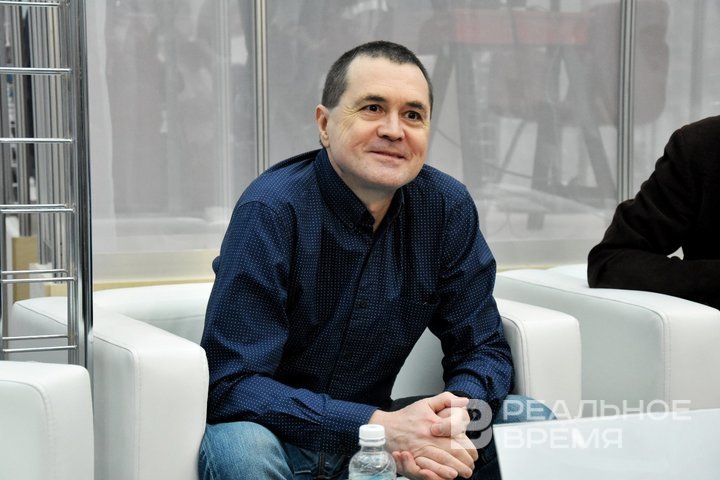Shamil Idiatullin: the idea that AI will replace writers is overrated
How science fiction writers predicted our future with artificial intelligence

Writers and artificial intelligence: alliance or conflict? How do technologies influence artistic creativity and is it worth worrying about the “replacement” of writers? Writer Shamil Idiatullin discussed this at the International Fair of Intellectual Literature non/fictioNvesna in Moscow.
Not for “intelligible writers”
In early 2023, the respected science fiction magazine Clarkesworld found itself at the centre of a digital storm: it was inundated with hundreds of stories created by artificial intelligence. Editor Neil Clarke reported that more than 50 such texts were received in one day alone, and the total number of machine submissions was about 500 out of 1,200 applications for the month. The stories, often formulaic and lacking in depth, were easy to spot, but their volume turned the selection process into a real fight against digital spam. The reason was “side hustle gurus” who promoted get-rich-quick ideas with the help of generative AI such as ChatGPT. As a result, Clarkesworld suspended accepting new submissions for the first time in 17 years, which became an alarming signal for the entire literary industry. But writer Shamil Idiatullin believes there is no need to worry too much:
“Artificial intelligence is a bit hyped and overrated. It reminds me of the fashion for 3D printers, 3D movies, e-books, electric cars and so on. That is, it was supposed to wipe out everything old. And then it turned out that it did not. This is a fully functional tool, wonderful and good, but of rather narrow use. For some, artificial intelligence makes life easier. But intelligible writers who write with their hands and heads are not among the beneficiaries.”

Indeed, it once seemed that e-books were about to displace paper books forever — but in fact, they replaced not eternal volumes in hard covers, but light novels “for one evening”, which are taken on a train and forgotten in a hotel. With books written by AI, according to Idiatullin, history will repeat itself. They are unlikely to replace works that you want to return to. But for one-time reading, machine writing is the best option. And again, the winners are not the classics, but those who are not a pity to forget.
“Quality literature is about living people at the current socio-psychological stage. A good book does not give answers, it poses questions that make the reader suffer, think, throw the book away. That is, processes are launched in the reader's head. Sometimes painful, sometimes unfinished, sometimes tormenting. This is what literature does. That is why good books tormented people in the 19th century and still torment them. Books that take care of conveniently scratching where it does not itch are also needed, and their authors are replaceable by any neural network.”
Not science fiction writers, but visionaries
The idea of artificial intelligence appeared in literature long before scientists seriously started talking about AI. In 1920, the Czech writer Karel Čapek in his play R.U.R.introduced the word “robot” into circulation — and with it the idea of a machine uprising. His robots were biomechanical creatures created to work. But at some point, they decided that they no longer needed people. This was not just a prediction, but an attempt to look into the moral and philosophical consequences of creating a non-human mind. Even then, science fiction writers understood that technology is not neutral, it carries questions of power, submission and freedom.

Later, in the middle of the 20th century, the baton was picked up by Isaac Asimov, the author of the famous Three Laws of Robotics. He did not so much frighten the reader as he tried to build an ethical architecture for the coexistence of man and machine. In his stories, robots often turn out to be more humane than people — they doubt, sacrifice themselves, seek the truth. Asimov made AI not a threat, but a partner in intelligence, and gave an entire generation an idea of how artificial intelligence can integrate into society without disasters. From that moment on, AI in literature began to live a full life: it was loved, feared, programmed and tried to be understood.
By the end of the 20th century, the image of AI became more complex and darker. In cyberpunk, which began with William Gibson's novel Neuromancer, AI is no longer a machine with arms and legs, but digital entities living on the Internet like spirits in wires. They bargain, hide, get out of control — and demand recognition as a form of intelligence. Science fiction writers were the first to sense that an algorithm could become a full-fledged hero of the plot — not a function, but a force. Their texts became a kind of sandbox in which possible scenarios of the future were tested: from techno-utopias to digital apocalypses. And today, when AI really begins to write, think and speak, it turns out that science fiction writers have already described all this — only in fiction.

Shamil Idiatullin recalled Fritz Leiber's novel The Silver Eggheads written in 1961 and translated into Russian back in Soviet times. In this book, humanity has long entrusted artificial intelligence not only with cleaning houses and calculating rocket trajectories, but also with writing novels. Writers have been replaced by “novel machines” — automatons that produce literary hits according to a given template, and no one reads real authors anymore. Leiber, with irony and accuracy, predicted decades in advance the fear with which we discuss neural networks today: will they be able to displace humans from art? But there is a catch in his dystopia — machines write texts that have no soul, risk, or unpredictability. The Silver Eggheads is not just science fiction, but a witty allegory for popular culture, where artificial intelligence becomes a reflection of the laziness and predictability of the consumers themselves.
Another interesting work that Idiatullin recommends paying attention to is Gordon Dixon's story Punch Cards Don't Discuss written in 1965. Here, artificial intelligence acts not as a rebellious mind or superintelligence, but as a soulless cog in a giant machine of automated absurdity. The main character, an ordinary person who is trying to return a defective copy of Kipling's Kim, ends up accused of murdering... Robert Louis Stevenson. All this thanks to failures in algorithms, the pedantry of machines, and society's complete faith in the infallibility of computers. Instead of humour, there is a dark satire on a future world where bureaucracy has been translated into code, and the human voice no longer means anything. This story is a brilliant example of how science fiction writers of the mid-20th century predicted our anxieties: what will happen if we completely transfer the right to truth to algorithms that do not know how to doubt.

“Science fiction is a piece of both literature and social creative activity that should help humanity cope with the current round of its existence. Science fiction appeared just when science began to develop in the second half of the 19th century. These are the books of Jules Verne. When the influence of science became obvious not only at the level of physical existence, but also at the social and public level, Herbert Wells appeared. And then it all started. It turned out that science determines the course of wars, the survival of humanity. It was necessary to cope with atomic energy, biological weapons, machine influence and, in general, with the internal combustion engine in the life of every person. Good science fiction studies these problems and asks questions in this area,” summed up Shamil Idiatullin.
Ekaterina Petrova is a book reviewer for the online newspaper Realnoe Vremya and the author of Buns with Poppy Seeds Telegram channel.